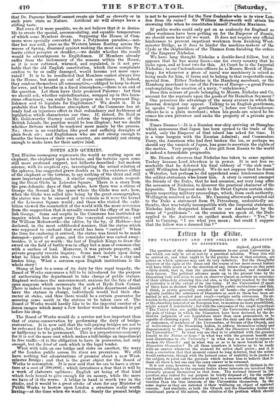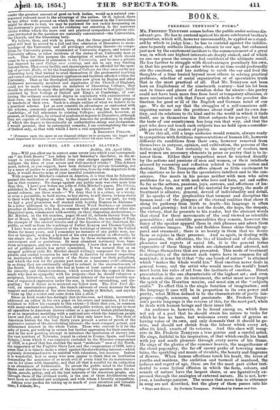rettrotu tbt attn.
TICE UNIVERSITY AND THE COLLEGES IN RELATION TO DISSENTERS.
Oxford, April 1854.
The question of the admission of Dissenters to our great Universities is one which can only be set at rest by a practical solution. When this will be arrived at, and what ought to be the precise form of that solution, are points on e hich opinions may and do vary infinitely. But the thoughtful observer of the signs of the times and the course of our more recent history will have little doubt as to the direction of any future changes on this point —little doubt, that is, that the question will be decided, and decided, in their favour. The political advance made up to the present time by the Dissenting body will seem to such an observer almost as certain an assurance of their ultimately attaining this end also, as the height reached by the tide of yesterday is of the extent of its rise today. If the Universities (I speak of them here as distinct from the Colleges) bapublic irleitial0M9—and this, I think, is pretty generally conceded on all hands—the principle which logically justifies the admission of Dissenters as such to them has been ad- mitted in act, and accepted past recall—vestigia nulla retrorsum. Its ex- tension to the present case rests on contingencies alone—the apathy of the body, or the absorbing interest of an European war, to mention no more possibilities, might retard it indefinitely ; but with the concession of the single hypothesis 'The Univer ities are public institutions," the Universities are put within the pale of things in which the Dissenters have been declared, by the de- liberate judgment of our Legislature more than once pronounced, to. be capable of claiming a part. It becomes then the duty and the interest alike of statesmen, of members of the Universities, of Meade of the Church, and of wellwishera of the Dissenting bodies, to address themselves calmly and dispassionately to the question, "How shall the Dissenters be admitted to the Universities ? " In what way are they to be admitted with the greatest benefit to the .Yation at large ? in what way with the greatest benefit and least disturbance to the University ? in what way so as least to injure or weaken the Church? and in what way so as to he most beneficial to the Dissenters themselves? To all these questions it behoves us to be reedy with an answer whenever the moment for action shall arrive' and it is from a conviction that that moment cannot be long deferred, that the writer would endeavour, though with the keenest sense of inability to do justice to the subject, to point out the grounds which induce him to believe- that to them all there is but one and the same answer to be returned.
It is not easy, however, to keep these questions entirely distinct in.the treatment, although to the, separate bodies whose interests are involved they naturally present themselves in that form. The national interest in- the question may indeed for our purpose be briefly disposed of for the nation can hardly have any other interest at heart in a. measure affecting the_Uni- versifies than the true interests of the Universities themselves. In the same degree as they are national, is their wellbeing an object of national concern. And similarly, as both the Church and the Dissenting bodies are constituent parts of the nation, the solution of the problem which' should confer tio greatest amount.of good= both bodies, would as amatural con- sequence redound most to the advantage of the nation. Or if, indeed, there be any olther wide ground on which the national interest in the Universities might be shown to rest, we may be pardoned for not rashly trespassing on the statesman's province, and for confining our attention to the narrower circles Within which the more real and practical sympathies of private citi- zens interested in the question are naturally concentrated—the Universities, the Church, and the Dissenting body. We believe, then, and wish to prove, that the three great interests indi- cated will best be served by a full and free admission of Dissenters to mem- berships of the University and all privileges attaching thereto—to compe- tition for University prizes, attainment of University degrees, and tenure of University offices, or other incidents of the status of an University man as such. That for this purpose the subscription of articles of faith should cease to be a condition of admission to the University, and become a private test imposed by each College now existing, and not in any way binding beyond them. That every facility and encouragement be afforded for the open- ing of private Halls, or for the foundation of Colleges for their own use by any Dissenting body that wished to avail themselves of the professorial teaching and varied educational and literary appliances and facilities afforded within the University. That as the theological lectures now given by Regius and other Professors necessarily members and dignitaries of the Church of England, could not be made compulsory on members of Dissenting Colleges, they should be allowed to enjoy the privilege (so far as related to theology) lately exercised by New College at Oxford and King's at Cambridge, of con- ferring the ordinary academical degree in conformity with examinations of their own, on their own members, who would be trained for that purpose by teachers of their own. Such is a simple outline of what we believe to be a practical scheme. Let us now consider its advantages as contrasted with the scheme, commonly advocated, towards which a step has been made at Cambridge, of full admission to existing Colleges; qualified, however, at present, at Cambridge, by refusal of academical degrees to Dissenters, although they are capable of obtaining the highest honours for proficiency in studies- of which the degree is theoretically an authoritative stamp and declaration. I would premise, that in subsequent remarks, I am contemplating the ease of Oxford only, as that with which I have a real acquaintance.* A RESIDENT FELLOW. * [Pressure upon the space at our disposal obliges us to postpone the larger and more important divisions of our correspondent's letter till next week.—En.]



























 Previous page
Previous page